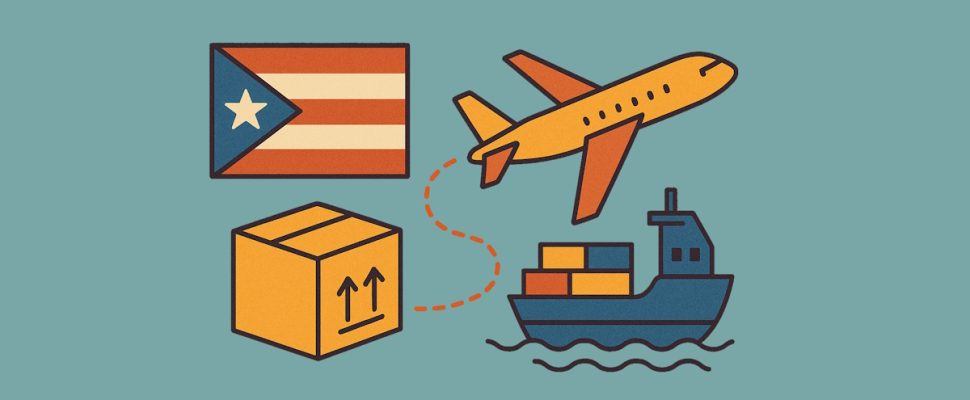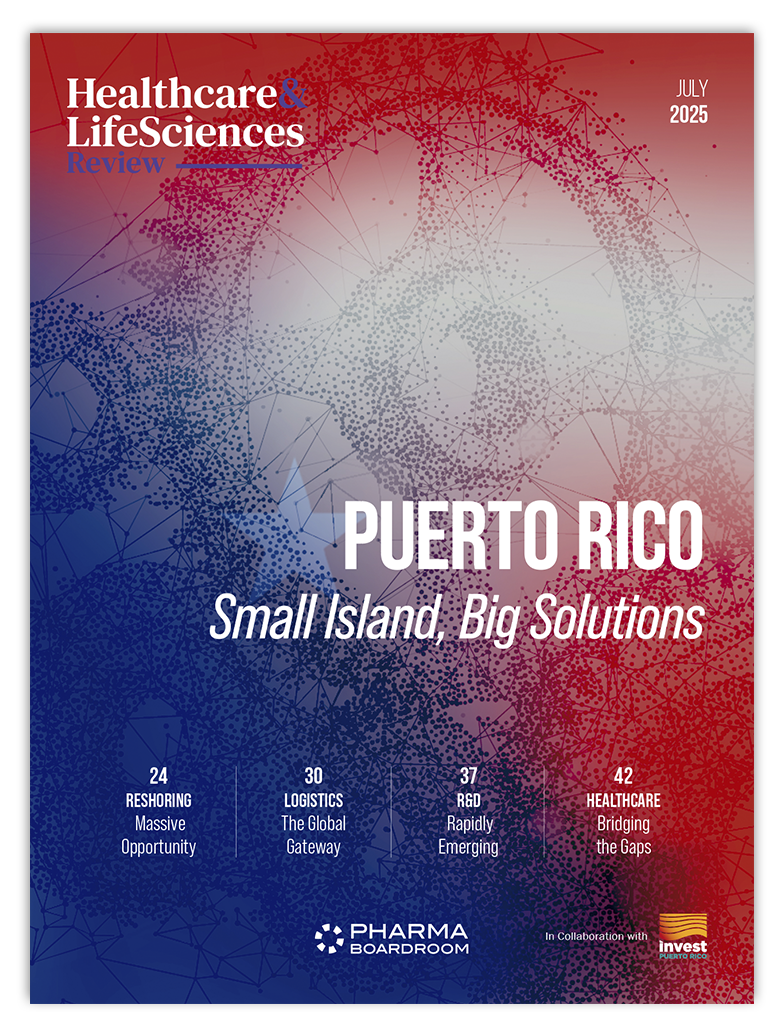The largest pharmaceutical hub in the Americas, Puerto Rico currently exports to 120 countries, accounting for nearly USD 53 billion in weekly biopharma shipments. Remarkably, this small Caribbean island out-exports all individual US states, shipping out over twice as much as second-placed Indiana. The life sciences industry is central to this success story, accounting for nearly a third of the island’s GDP and over 70 percent of its exports.
“The island has a unique combination of infrastructure and expertise, which makes it an ideal place for manufacturing high-value products like pharmaceuticals,” proclaims Basil Khalil, VP of Operations for Caribbean & Central America at international logistics titan FedEx. “FedEx has been operating in Puerto Rico for 45 years, and we have made substantial investments in this market to support the growing demand for rapid, secure transport of life sciences and healthcare-related goods.”
“FedEx has made continuous multi-million dollar investments in Puerto Rico’s facilities and fleet upgrades over the last decade, including state-of-the-art temperature-controlled rooms, digital tracking solutions, and additional capacity at both San Juan and Aguadilla airports.”
With many of these firms now holding internationally recognised quality certifications; regulation in place that allows Puerto Rico to serve as a strategic air cargo transshipment point under certain customs provisions; and the establishment of an ‘Air Cargo Community’ uniting industry and government stakeholders, the future looks bright.
Transshipment Waiver: A Game Changer?
For decades, most of Puerto Rico’s cargo was routed through the US mainland for further distribution; a costly process due to the Jones Act (officially the Merchant Marine Act of 1920), which requires that goods moving between US ports use US-built, -owned, and -crewed ships.
However, since April 2020, Puerto Rico has been the beneficiary of a waiver from the US Department of Transport (DOT) on air cabotage which allows for international cargo and passenger transfers at three airports (SJU, BQN, PSE). The recent renewal of this DOT transshipment waiver up to 2027 is, in the words of INDUNIV Research Centre CEO and Air Cargo Community board member Ivan Lugo, “The biggest recent news for Puerto Rican logistics.”
He explains, “This waiver creates tremendous opportunities for Puerto Rico’s logistics industry. Many airlines currently fly over Puerto Rico, but they do not stop. With the new transshipment waiver, we can attract airlines to make technical stops, drop cargo for added value activity and pick up cargo to new destinations.”
While the opportunities are clear, some stakeholders are urging caution. “While this policy shift has broadened the island’s potential, its full impact depends on a parallel increase in local manufacturing output,” warns Rodney Colón, president of GMD Airline Services, an appointed ground handler for several major international airlines operating on Puerto Rico. He adds, “Infrastructure and regulatory flexibility are in place, but they must be matched by production volumes that justify expanded air connectivity.”
CEIV Certifications: Raising the Bar
The island’s government is keen to leverage the momentum from the DOT waiver reauthorisation and double down on its logistics capabilities. “The governor has worked hard to strengthen Puerto Rico’s role in the air cargo sector, particularly in sectors like healthcare and life sciences,” explains Secretary of the Department of Economic Development & Commerce (DEDC) Sebastián Negrón Reichard.
“Through the hiring of a specialist, DEDC is helping local manufacturers improve logistics and transportation of their goods. We are also investing in cold storage capabilities, employee training, and company certifications to manage sensitive products, with seven companies currently qualified to handle specific air cargo needs (CEIV Pharma cold chain certification from the International Air Transport Association (IATA) – ed.) and plans to train four more.”
These seven certified companies include both global players like American Airlines and Expeditors as well as local outfits Prime Air Corp, ETH Cargo, César Castillo, Isla Frio, and GMD. CEIV Pharma certification ensures all aspects of a company – from training to equipment, infrastructure, documentation, and quality systems – meet rigorous global standards for safe, temperature-controlled pharmaceutical handling and transport.
Additionally, both Luis Muñoz Marín Airport (SJU) and FedEx (at SJU and Rafael Hernández Airport in Aguadilla, BQN) are now CEIV Pharma-certified, making them key hubs for safe, compliant pharmaceutical handling in Puerto Rico.
The Power of Partnership
The Puerto Rico Life Science Air Cargo Community (ACC) was crucial to securing these CEIV certifications and bringing a previously fragmented ecosystem together. Modelled after successful pharma cargo hubs in Brussels and Amsterdam and supported by Invest Puerto Rico and the DEDC, the ACC is an inter-stakeholder collaboration platform “that allows shippers to voice their needs, airlines to share their constraints, and everyone involved to ensure there is clear communication and compliance in managing critical products,” explains Sascha Herzig, president and CEO of ETH Cargo.
GMD’s Colón agrees. “The establishment of the ACC has been a vital development in advancing the island’s role within global logistics,” he adds. “For years, there was a notable gap, a lack of a unified platform bringing together all relevant stakeholders. The formation of this community, which now includes government agencies, manufacturers, airlines, freight forwarders, and handlers like GMD, has created a more coordinated and cohesive environment. Regular dialogue between these groups has not only improved day-to-day operations but also strengthened the island’s strategic alignment around shared goals.”
Having the life science logistics community as a united front is also a key selling point to potential investors, as Tom Vincent, vice president of Prime Air Cargo, points out. “By aligning capabilities across the supply chain – such as air cargo and ground transportation – we provide a comprehensive and reliable logistics framework. This gives Puerto Rico a significant advantage when attracting new pharmaceutical companies. For instance, when organisations like Invest Puerto Rico promote the island to potential investors, they can highlight our dedicated life sciences air cargo community as a unique asset.”
As an example of how this culture of collaboration manifests in practice, global shipping giant UPS has partnered with local pharmacy chains to create access points and with a local firm Islandwide on intra-island deliveries. “Both projects enhance flexibility, expand coverage, and strengthen Puerto Rico’s logistics ecosystem, allowing us to better serve customers across the island,” proclaims José F. Oramas, Caribbean GEO country manager, whose firm now operates more than 100 flights per month from Puerto Rico to mainland US.
However, as Geoffrey Parrillo, founder of cold chain storage solution provider Isla Frio, warns, “while there is a concerted effort to get stakeholders to collaborate, there is sometimes a disconnect between the needs of the industry and what is available.” He outlines, “For instance, when we were looking to expand our storage capacity, the process was somewhat complicated as banks want to know who will be using the facility before they will finance it, but companies are often hesitant to commit until the infrastructure is already in place. This kind of challenge is something that needs to be addressed for the industry to thrive, but I do see positive steps being taken in the right direction.”
Built for the Unexpected
As detailed elsewhere in this report, Puerto Rico’s frequent power outages and its susceptibility to natural disasters are a major roadblock to increased exports and investment.
However, those that have managed to survive and thrive against this backdrop have become increasingly resilient and flexible. As ETH Cargo’s Herzig notes, “Pharmaceutical manufacturers expect logistics partners like us to match their level of preparedness. By maintaining up-to-date plans, we ensure continuous access to air and ocean shipment capacity, even during crises. Success in overcoming these challenges depends on staying vigilant, conducting frequent reviews, and collaborating closely with our clients to align contingency strategies.”
Multinationals, including the likes of FedEx, have adapted too. “Puerto Rico presents unique logistical challenges due to natural events like hurricanes, earthquakes, and occasional geopolitical issues that can disrupt supply chains,” says FedEx’s Khalil.
“That’s why we have made significant investments in infrastructure to ensure flexibility. For example, we operate out of two airports on opposite sides of the island. This redundancy allows us to adapt quickly if natural disasters or disruptions impact one area of the island, ensuring we can continue moving goods without compromising reliability or product integrity.”
Moreover, if a new technology or process works in Puerto Rico, it can probably work anywhere. “Puerto Rico certainly leads a lot of the innovations within the company, particularly when it comes to healthcare logistics,” adds Khalil. “The technologies and processes that we develop here often set the tone for broader applications worldwide. For example, innovations in temperature-sensitive shipping or healthcare logistics are often piloted in Puerto Rico before being rolled out globally.”
What’s Next?
Where is a more unified, certified, and unburdened Puerto Rican life science logistics sector heading next? Education is a key pillar; led by the ACC, programs at the University of Puerto Rico in Bayamón, Mayagüez, and other private institutions are training the next generation of professionals in supply chain and logistics.
“This marks a pivotal shift, formalising logistics as a recognised professional path and creating a structured pipeline of talent to support the evolving needs of the industry,” states GMD’s Colón.
Then there will be the expansion of CEIV certification to four additional companies – Magic Transport, Droguerías Betances, DSB and the Air Group – in the near future as well as to the airports at Aguadilla/Borinquen and Ponce.
Looking ahead, stakeholders such as Ivan Lugo believe the island can evolve from a prolific exporter into a true redistribution hub, funnelling high-value therapies from South America to Europe, the Middle East and Asia via its newly won transshipment freedoms. Coupled with a widening circle of CEIV-certified operators, redundant airport capacity and a purpose-built talent pipeline, Puerto Rico is positioning itself to become an indispensable link in the world’s life-science supply chains; one that moves far more than its own medicines.


